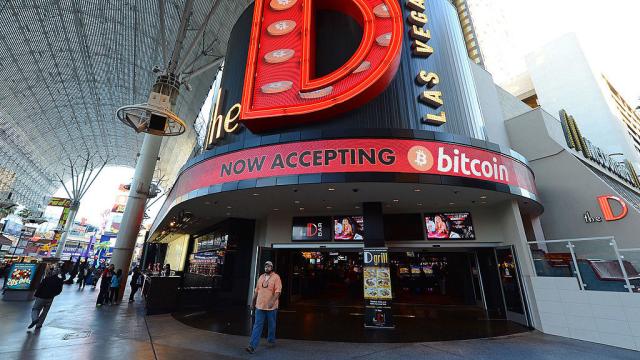Photo: Getty
Less than a week ago, headlines declared that a market-shaking fork in Bitcoin had been averted. But the people backing a new cryptocurrency called Bitcoin Cash have now announced that the expected compromise between warring factions is dead. Next week, the huge Bitcoin fork will begin, and here’s what it’s all about.
[referenced url=”https://gizmodo.com.au/2017/07/37-million-in-ether-stolen-as-people-refuse-to-learn-their-lesson-about-cryptocurrencies/” thumb=”https://i.kinja-img.com/gawker-media/image/upload/t_ku-large/boxiytzbgpmvjs6nriwq.jpg” title=”$US40 ($50) Million In Ether Stolen As People Refuse To Learn Their Lesson About Cryptocurrencies” excerpt=”Photo. BTC Keychain / Flickr Unknown hackers made off with an estimated $US40 ($50) million in hot cryptocurrency Ether, one of the most popular of the innumerable successors to Bitcoin, this week.”]
The debate over a so called “hard fork” in Bitcoin has been going on for two years. The world’s most valuable cryptocurrency is getting older and it’s reached highs of more than $US2,600 ($3,254) in recent months. From the beginning, it has had defined limits on how much data the Bitcoin network can process every 10 minutes. This was, in part, to keep a check on the speed of its growth and to serve as a security measure against cyber attacks. But some Bitcoin miners have become frustrated with the sluggish pace of the cryptocurrency. Blocks of transactions are required to be less than one megabyte and around five transactions are processed each second. In recent weeks, traders have faced up to seven hours in wait times for a single transaction according to activity tracker blockchain.info’s data.
Supporters of the new Bitcoin Cash (BCC) want a larger data cap on blocks. This would mean more coins being mined and more transactions being processed in a short amount of time. According to the New York Times, the BCC team is made up of mining investors and entrepreneurs that are largely based in Asia.
On the old school Bitcoin team, you have a group of people known as the core developers. This decentralized set of programmers maintain the software behind bitcoin and they have opposed increasing the data cap per block. The biggest argument against the increase is that it would put smaller miners at a disadvantage against the well-funded mega-miners.
Anyone can use a server to process and verify Bitcoin transactions. These miners are rewarded with Bitcoin based on how many transactions they process. It’s an expensive and time-consuming game. Hobbyists will be lucky to crank out a single bitcoin in a month but major mining operations like ViaBTC run huge server farms that can exponentially outpace the small fries.
The compromise that was so recently considered to be a done deal involved the core developers agreeing to implement a system called Segregated Witness or SegWit. This software update to standard Bitcoin is set to be implemented in August and will gradually increase the maximum block size. While the New York Times claims that the core developers do not intend to make any size increases in the “coming months,” the original compromise was to up the data cap to two megabytes by November. SegWit maxes out at 4MB blocks and its implementation is still planned to move forward. One thing that will stall SegWit’s deployment is that 95 per cent of the network has to signal its support first. This is to prevent a different fork that would naturally occur if some people switch to a new client and leave others behind.
Yes, the details of this stuff are complicated. But the fundamentals really aren’t. Bitcoin supporters want to keep the scaling modest and cautious. BCC supporters want to go go go. There are also political and philosophical differences surrounding what Bitcoin is supposed to mean for the everyman.
Bitcoin Cash is promising an immediate increase on the block size limit to 8MB and it will leave room for future increases. This should speed up transaction times and hopefully take care of a couple other issues that have raised complaints in the community. BCC organisers have also assured everyone that they will immediately be able to convert their Bitcoins into the equivalent BCC, but there’s a catch. If your Bitcoins are stored with a third-party exchange, you’ll have to talk to them about the implementation. They could decide to not deal with BCC at all. The short term solution is for Bitcoin holders to take control of their private keys before the August 1st launch.
To be clear, those who want to make the exchange, in the beginning, should be able to trade one Bitcoin for one Bitcoin Cash. As time goes on, the exchange rate will change.
What does all this mean for the future? No one can really say for sure. It’s likely that there will be a large-scale flight from Bitcoin to BCC and major investors like Roger Ver have said that they will be throwing their full weight behind the new cryptocurrency. BCC is already trading future contracts at a cost of about $US400 ($501). That’s significantly cheaper than Bitcoin and the original’s price will have to be reevaluated.
Keep in mind that physical currencies have weathered forks, and Bitcoin’s closest competitor, Ether, forked last month. Both Ether and Ether Classic have gone higher than the pre-fork price. Some fan sites like Should I Sell My Bitcoin just automatically return an answer of “No” at all times. We’ll see if this fork changes those enthusiasts’ minds.
